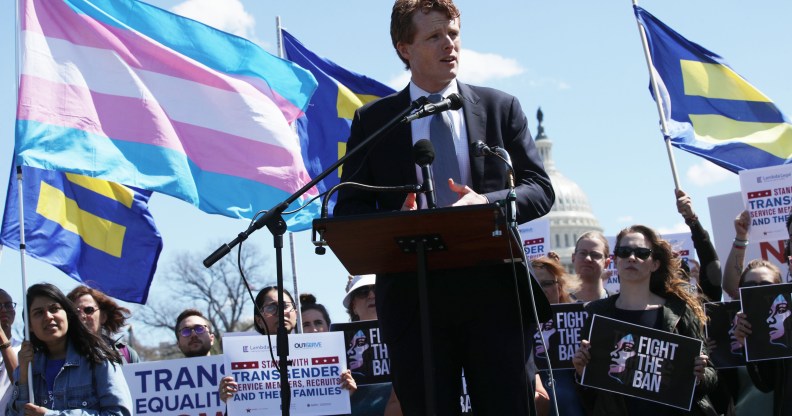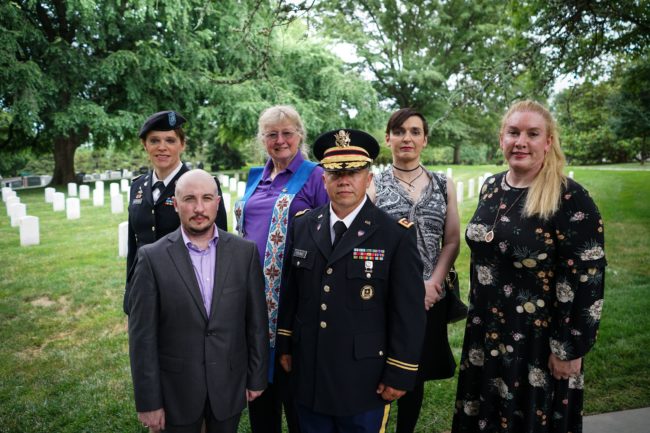Trump’s transgender military ban: 13,700 could lose their jobs from today

Democratic lawmakers joined activists to rally against the transgender military service ban. (Alex Wong/Getty Images)
Donald Trump’s ban on transgender military service people takes effect from today, jeopardising the livelihood of thousands.
Almost two years after Trump first announced his much-maligned policy on Twitter, legislation banning trans people from openly serving in the military has been enacted.
According to the Palm Center, about 13,700 people will lose their jobs as a result.
“The military is the largest employer in the nation and, as the USTS found, transgender people are twice as likely to have served in the Armed Forces as the general population,” Gillian Bransetter, media relations manager for the National Center for Transgender Equality, told Advocate.
The 2015 US Trans Survey (USTS) found that 18 per cent of all trans people have served in the military, which is thought to be the single largest employer of trans people today.
When does the transgender military ban begin?
Trump first announced the ban in a series of tweets on July 26, 2017.
“After consultation with my generals and military experts, please be advised that the United States government will not accept or allow transgender individuals to serve in any capacity in the US military,” he wrote.
“Our military must be focused on decisive and overwhelming victory and cannot be burdened with the tremendous medical costs and disruption that transgender in the military would entail.”
“We cannot be burdened with the tremendous medical costs and disruption that transgender in the military would entail.”
—Donald Trump
The White House formally announced the policy in March 2018, which was blocked by a series of four injunctions.
In January 2019, the first injunction was lifted by an appeals court in Washington DC, with the Supreme Court removing a further two (from California and Washington state) in the same month.
On March 27 the final hurdle was lifted, paving the way for the ban to be enforced from Friday (April 12).
Who will be affected by the transgender military ban?
Since trans people were first allowed to enter service in 2016, almost 15,000 are estimated to have joined the military.
Any person who comes out or is outed as trans from April 12 will be discharged, unless they are willing to suppress their identity. The military will not pay for any gender confirmation surgeries, apart from those which will “protect the health” of people who have begun to medically transition.
After April 12, those applying to join the services with a record of gender dysphoria will have to adhere to the gender they were assigned at birth in order to serve. A doctor will have to certify that they have been stable in that gender for at least 36 months, and that they have not medically transitioned.
Transgender people without a diagnosis will be permitted to serve in the gender they were assigned at birth, but only if they have not had any confirmation surgeries.

Transgender veterans joined to lay a wreath at the Tomb of the Unknown Soldier (Mandel Ngan/AFP/Getty)
There are exemptions for active service members who have been diagnosed with gender dysphoria, including those who have already completed a medical transition before the policy takes effect.
According to the Palm Center, just 937 people will qualify for the grandfather exemptions, which they note could be revoked at any time.
The Navy has released guidance noting that sailors will be permitted to live “in their preferred gender” while off-duty.
“Appropriate civilian attire, as outlined in the uniform regulations, will not be determined based on gender,” a statement read, though this may be limited “to meet local conditions and host-nation agreements with foreign countries.”
Criticism of the transgender military ban
The Palm Center’s director Aaron Belkin is one of many who has called the ban “a return to don’t ask, don’t tell,” the military’s pre-2011 ban on LGB people.
“Fully 100% of transgender troops are threatened and stigmatised by this ban,” Belkin said a statement on April 9.
In Washington, criticism of the policy has come from both sides of the aisle.
Conservative pundit Meghan McCain tweeted on Wednesday (April 10): “It is indefensible that Trump’s ban on Transgender troops is being implemented on Friday.
“This discriminatory policy will lead Transgender service members, patriots who have decided to serve their nation, to live in the shadows.
“It’s an unfair, un-American, and dangerous policy.”
House speaker Nancy Pelosi is one of many Democrats to rebuke the ban, labelling it an “act of cruelty” on April 3.
Trump’s claims that transgender people “burden” the military “with the tremendous medical costs” has also been wide refuted.
In 2016 the RAND corporation estimated that these costs would amount to somewhere between $2.4 million (£1.8 million) and $8.4 million (£6.4 million) annually.

